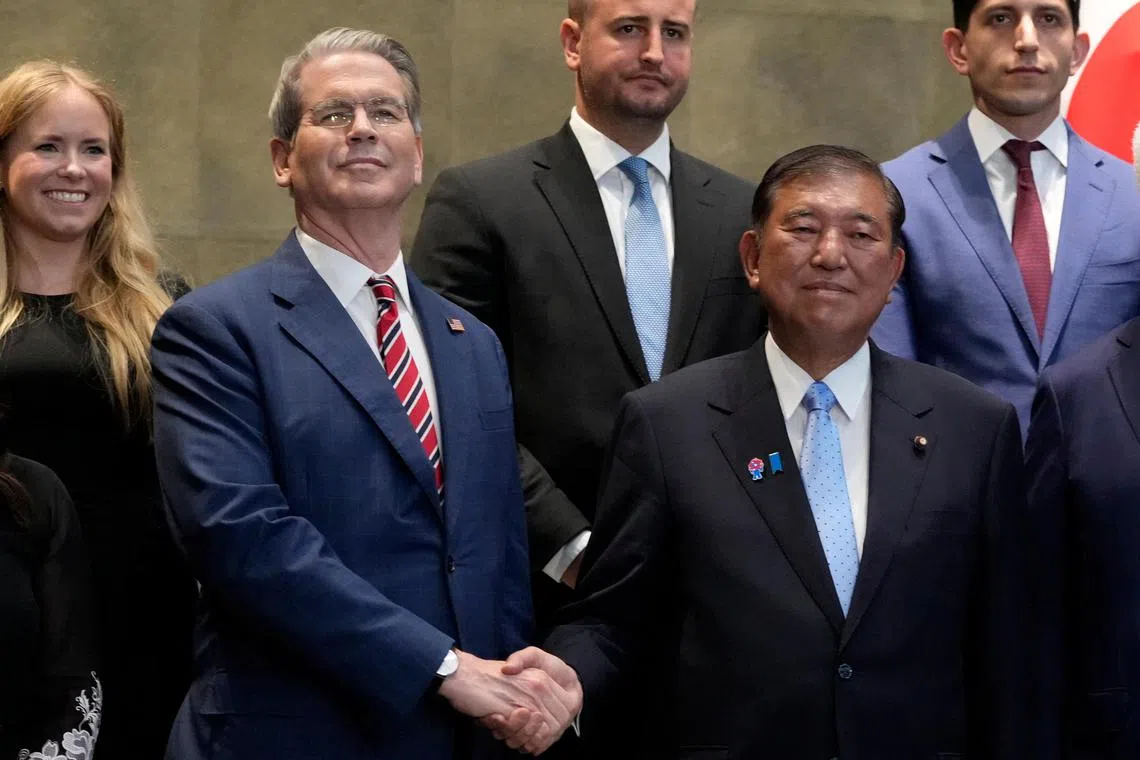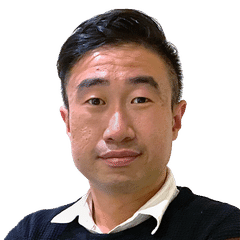‘We will not be taken for fools’: Under election pressure, Japan PM stands firm on trade with US
Sign up now: Get insights on Asia's fast-moving developments

Japanese Prime Minister Shigeru Ishiba (right) shaking hands with US Treasury Secretary Scott Bessent, before their meeting at the Prime Minister's Office in Tokyo on July 18.
PHOTO: REUTERS
Follow topic:
- Premier Ishiba faces pressures ahead of Upper House elections due to US tariff threats and domestic issues like the cost-of-living crisis
- His government struggles with US trade negotiations; inexperience and rigid principles hinder trade deal prospects
- If Ishiba cannot garner a majority, he will face policymaking difficulties and need to give more concessions to the opposition
AI generated
TOKYO – Japanese Prime Minister Shigeru Ishiba has been full of bluster during street rallies for the Upper House election on July 20, striking a note of defiance over US trade tariffs as he swore that his country “will not be taken for fools”.
Mr Ishiba, who also faces domestic pressures, said at a rally speech in Funabashi, near Tokyo, on July 9: “This is a battle fought over national interests. We must say what we have to say, squarely and bluntly, to our ally. We will not be disrespected.”
He would later stress that Japan is “not to be underestimated”.
While Tokyo was expected to dig in its heels
Such rhetoric may be par for the course for leaders of other security allies of the US, such as European countries, but it is rare for any Japanese prime minister to speak out so harshly in public.
Will Mr Ishiba be rewarded for his bluntness?
His statements were borne out of domestic political expediency, and he struck a more conciliatory tone at an inconclusive half-hour meeting with visiting US Treasury Secretary Scott Bessent
Mr Ishiba said in opening remarks that he hoped their countries can “continue vigorous discussions to reach an agreement that benefits both sides”.
Mr Bessent replied: “I am sure we can reach a good agreement.”
The latter was leading a delegation to attend US “National Day” festivities at the Osaka World Expo on July 19, and it is understood that no trade talks have been planned during his visit.
Mr Ishiba told reporters after the meeting: “Nothing has been fixed, including a meeting with President (Donald) Trump, but I believe there will naturally be an opportunity to talk directly with the President with our national interests on the line.”
The lack of any diplomatic breakthrough will weigh on Mr Ishiba, who had been a maverick on the fringes of the LDP until he was propelled to power under the most unlikely of circumstances.
This means Mr Ishiba has a weak support base within the party, and his tenuous grip on power will be further tested.
He has set a target for the LDP and its coalition partner Komeito to win at least 50 seats to defend their majority in the Chamber.
The ruling coalition currently holds 75 seats that are not up for election, with 125 seats of the 248-seat House under contest.
Elections are held every three years for half the House seats, with members holding six-year terms.
But Japanese media outlets this week have uniformly forecast that even winning 50 seats would be a tall order for the besieged leader, although this might not spell the killer blow to Mr Ishiba’s incumbency
There are no clear successors within the party, as the leadership role is seen as a poisoned chalice amid feeble public support.
After the Upper House polls, no national election is due until 2028, while the LDP will hold its next leadership election in 2027 if Mr Ishiba does not resign prematurely.
Holding a minority in the Upper House, however, would severely complicate policymaking, given that the LDP-Komeito coalition also has a minority in the Lower House. This means the LDP will have to bend over backwards to make even more concessions than it does now to the opposition to pass legislation.
The hustings have been dominated by anti-foreigner sentiment
The ultra-conservative party had its origins as an anti-vaccine group but has enjoyed a meteoric rise with its unabashed “Japanese First” slogan and its spreading of misinformation about foreigners getting preferential treatment at the expense of citizens.
Sanseito has latched on to right-wing conspiracy theories propagated by Russia-affiliated social media accounts – the government on July 16 said Japan has been a “target of foreign election interference” – claiming that Japan is facing a “silent invasion” of foreigners and at risk of becoming an “economic colony” given the influx of foreign investments and tourist dollars.
Another dominant issue is the cost-of-living crisis, epitomised by soaring rice prices cuts to the consumption tax,
What has not helped Mr Ishiba’s quest for the LDP’s electoral victory is Mr Trump’s July 7 salvo, which came days into the election hustings, that Japan will face a “reciprocal” tariff of 25 per cent from Aug 1.
This marked a 1 percentage point increase from the proposed rate in April and is separate from sectorial duties already in force for cars and car parts, as well as steel and aluminium.
Mr Trump has placed squarely in his crosshairs
As the clock winds down on the Aug 1 deadline, Mr Trump on July 15 again bashed Japan
“I think probably we will live by the letter with Japan,” he said.
“Trump is not playing a bilateral game, so whatever Japan has done would not have worked,” geoeconomics expert Saori Katada of the University of Southern California told The Straits Times.
“The deeper the interdependence, the more effectively coercion hits,” she said, noting that a US-Japan trade agreement was already brokered between Mr Trump and then Prime Minister Shinzo Abe in 2019.
“Given the existing trade deal, Japan has not much to give to the US,” she added.
Dr Sota Kato, a former Japanese trade negotiator, told ST that Tokyo’s belief – that it was a valued ally with a special relationship with the US, which would grant it a fast track to a deal – was misplaced.
“Japan has been sticking to a stance grounded in principle, rather than pragmatism, in this negotiation. While such an approach worked reasonably well in past bilateral negotiations with the US, it doesn’t seem to be effective this time,” he said.
“If Japan is to strike a deal, it will need to move beyond rigid principles and seek practical concessions, including the reduction of some non-tariff trade barriers.”
Dr Kato, who is now a research director at The Tokyo Foundation for Policy Research think-tank, pointed to inexperience for the current lack of success.
Chief trade negotiator Ryosei Akazawa has visited Washington seven times without tangible results, which was “highly unusual”.
“It appears that Akazawa may have only engaged at the bureaucratic preparatory level, rather than taking true political initiative,” Dr Kato said. “Ishiba’s limited political network is having a noticeable impact.”
He feels that it would be very difficult for Mr Ishiba to reverse course and offer heavy concessions even after the election.
“If the Ishiba administration were to abruptly shift its stance, it would likely face strong criticism from farmers and the auto industry. That makes such a reversal politically difficult,” Dr Kato said.
The impasse with the US boiled down to a “lack of leadership to make tough and swift decisions”, he added.


